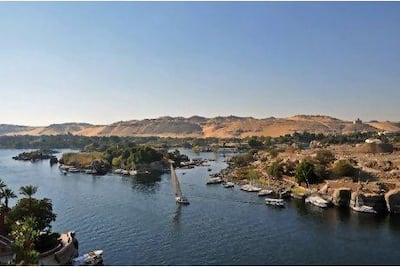The former home of Abbas Al Akkad, one of Egypt’s most renowned writers, has been marked for demolition.
The planned demolition of the house in Aswan was confirmed by the southern city's governor on Wednesday. He said an engineering committee advised the government to demolish the dilapidated building after appraising it in 2021.
Ramy Al Akkad, the late writer’s grandson, who still resides in the house, told The National that as of Tuesday night, the family had not received an official notice of the demolition.
Built in the late 1800s, the home has been in severe disrepair for years.
Ramy Al Akkad said a restoration project announced in 2016 by Egypt’s Ministry of Culture and the Aswan municipality never materialised.
“We were very surprised to hear of the demolition, mostly because we had been waiting for the culture ministry to let us know what the status of its restoration plans were for years now,” he told The National.
“The house has since 2016 been visited by many committees. The former culture minister even visited and promised the family to make the restoration a priority.”
Plans for the demolition were met with widespread criticism from fans of the author on social media.
The governor of Aswan, Maj Gen Ashraf Attia, confirmed to local news outlets that a committee advised the government to demolish the building in 2021.
However, he said since receiving feedback from fans on the plans, he has contacted Prime Minister Moustafa Madbouly for advice on what to do next.
Ramy Al Akkad said engineers visited the home in 2021 to determine whether it would be eligible for the restoration, but the results were never shared with the Al Akkad family.

“Until today, fans of his writing still come down to visit the home and ask to be shown around. That’s why I think it could be beneficial to restore the home, not just for the family, but for the country as well,” he said.
The family had periodically carried its own repairs to the house. But in 2016, they were asked by the architectural heritage department of the culture ministry to cease any private renovations.
The property still houses the first editions of Al Akkad’s works and a number of his former possessions, although most of his belongings are kept at a nearby cultural centre in Aswan, said Hesham Atwa, the head of the General Authority of Cultural Palaces.
Mr Atwa told The National that because the author’s former home still belongs to his family, the authority has no jurisdiction to step in.
Fans of the writer took to social media to express their disappointment at the plans, with many criticising the government’s repeated demolitions of landmarks connected with Egypt’s intellectuals.
Many pointed to the demolition of portions of Cairo’s famed City of the Dead, a Unesco heritage site, to make way for flyovers.
In December, the daughter of deceased Egyptian author Yahya Haqqi said his tomb in Islamic Cairo had been marked with a red X, meaning it was slated for demolition as part of the development project.
In late August, the government backtracked on plans to demolish the grave of Taha Hussein, another renowned Egyptian intellectual, following a campaign led by Hussein’s granddaughter, activist Maha Aon.
Al Akkad is undoubtedly one of the most celebrated literary figures in Egypt’s history. He was known for his encyclopaedic knowledge of the country and was an instrumental figure in the 1919 revolution that gave Egypt nominal independence from Britain.
A journalist at the time, Al Akkad reported extensively on the turmoil because of his close friendship with revolutionary Saad Zaghloul, whose Wafd party led the revolt against the British at the time, who once called Al Akkad “the mighty writer”.


